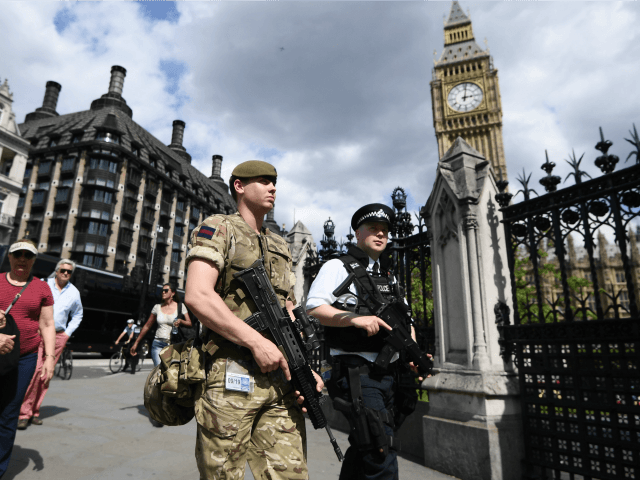With almost 1,000 soldiers deployed to Britain’s streets to release police firearms officers for counter-terror operations, Home Secretary Amber Rudd has been forced to deny that massive police cutbacks impacted security.
Police numbers fell by around 19,000 in England and Wales between September 2010 and September 2016.
Between 2009 and 2014, the number of Authorised Firearms Officers (AFOs) fell by more than 1,300 – 19 per cent – before the Paris terror attacks in 2015 prompted a belated effort to train replacements.
However, Home Secretary Amber Rudd has officially denied that cuts carried out during Prime Minister Theresa May’s tenure in the post have impacted the authorities’ capacity to deal with terrorism.
She claimed she had “asked the head of counter-terrorism whether this is about resources. It is not.”
She added, “We must not imply that this terrorist activity may not have taken place if there had been more policing.”
After this speech at police fed 2015 I reminded Mrs May that at the end of the cry wolf story there was a wolf https://t.co/efKH7duuB3
— Krishnan Guru-Murthy (@krishgm) May 25, 2017
But Steve White, chairman of the Police Federation which represent police constables up to the rank of Chief Inspector, said the fact that “armed military are having to replace armed police officers in order to release that resource clearly sends a concerning message.”
White also highlighted the fact that both armed police and military personnel can generally only react to incidents after the fact, emphasising the necessity of strengthening neighbourhood policing so jihadists can be stopped before attacks take place.
“Prevention is better than cure. We know the information to stop these mindless attacks exists within communities and great work is being done to forge strong, valuable relationships to capture this,” he said.
“[I]t cannot be jeopardised by reducing the contact the police has with the public. Neighbourhood policing – bobbies on the beat, if you like – has never been more important.”
The moment in 2015 that @theresa_may was told her government attacks and cuts on police were dangerous, by a police officer of GMP. pic.twitter.com/qgX1t0kty9
— Andrew Scattergood (@AJScattergood) May 24, 2017
Rudd’s and White’s comments come as it emerges that a decorated Manchester police constable, Damian O’Reilly, warned Theresa May that police cuts had caused neighbourhood policing to “collapse” and local intelligence to “dry up” at the Police Federation conference in 2015, risking national security.
“You’ll remember in November 2010 you presented me with the ‘Community Police Officer of the Year’ award,” he told the then Home Secretary.
“I say that, conference, forgive me, just to show that I do know what I’m talking about.
“I worked in inner city Manchester for 15 years. I felt passionate about what I was doing [but] in 2012 I had to leave. I couldn’t take it any more.
“Because because the changes that have been imposed have caused community policing to collapse. That’s the reality, ma’m.
“Intelligence has dried up, there aren’t local officers, they don’t know what’s happening. They’re all reactive. There’s no pro-active policing locally. That is the reality, ma’am.”
O’Reilly also warned, presciently, as it turned out, that “neighbourhood policing [is] critical to dealing with terrorism [and] we run the risk, here, of letting communities down, putting officers at risk, and, ultimately risking national security.
“I’d ask you to seriously consider the budget and the level of cuts over the next five years,” he concluded.
Police force expansion of the 00s undone by spending cuts – fewer officers now than in the late 1990s. Read more: https://t.co/O4I8ExwS8P pic.twitter.com/9UXDCs2qNc
— IFS (@TheIFS) May 15, 2017
Mrs May was unmoved, however:
“The Federation warned that spending reductions mean we’ll be forced to adopt a ‘paramilitary style of policing’ in Britain. Today you said that neighbourhood police officers are an endangered species.
“I have to tell you, that this kind of scaremongering does nobody any good.”

COMMENTS
Please let us know if you're having issues with commenting.